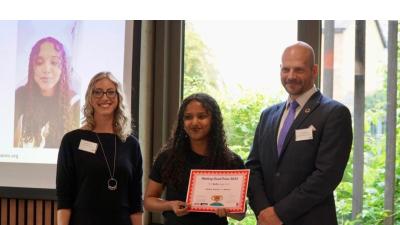
Training seafarers for a decarbonised future
Maritime Just Transition Task Force collaborative project sets framework to equip seafarers with skills as shipping transitions to zero emissions.
This page is approximately a 3 minute read
This page was published on

The Making Spaces project, a Lloyd’s Register Foundation-funded research and development project encouraging young people into engineering and safety-based careers, has launched a set of new, free resources for the makerspace and informal science, technology, engineering and mathematics (STEM) education sector.
Makerspaces are informal multipurpose sites designed for collaborative hands-on learning and creative production. The spaces offer young people the opportunity to share skills and ideas, providing an ideal environment for encouraging active participation in STEM. On Tuesday 18th June 2024, the project team hosted an event in Waterloo, London, to showcase and discuss the new resources with key stakeholders across the makerspace and STEM sector.
The Making Spaces project is a four-year international research and development collaboration that works with practitioners and young people from partner makerspaces in five countries (Nepal, Slovenia, USA, UK and Palestine) to identify, develop and share equitable approaches that can support diverse young people to engage meaningfully with STEM-based subjects.
The new resources explain ‘The 3-STEP (3 Steps Towards Equitable Practice) Approach’ which help STEM educators make equity a reality. Co-produced by practitioners, youth co-researchers and UCL academics, the resources include an online, self-paced course and a comprehensive guidebook, both of which contain case studies, activities and practical tools that practitioners can implement in their work.
Over the project, the team iteratively developed and trialled the approach, collecting extensive qualitative and quantitative data to understand its impact on youth and makerspace practitioner outcomes. Pre- and post- data showed positive outcomes for all involved - practitioners, organisations and, most importantly, young people all reported significant benefits as a result of participating in programmes that used the approach. For example, 90% of young people felt more connected to STEM and 87% had increased interest in pursuing a career in STEM, whilst 96% of practitioners felt more confident to design equitable youth programmes. At an organisational level, 83% of practitioners reported that their makerspaces had improved the inclusion of diverse staff and 72% reported an increase in the number of diverse young participants taking part in their courses and programmes.
The event concluded with an award ceremony for the inaugural Making Good prize, which provides a unique platform for youth-led making that focusses on promoting social good. Dr Tim Slingsby, Director of Skills and Education at Lloyd’s Register Foundation, joined Professor Louise Archer on stage to congratulate each project winner.
The prize sought to highlight the value of inclusive STEM participation and the powerful, inspiring role that young people can play in creating safe, sustainable and socially just communities. Winning entries ranged from an innovative waste sorting system to an adapted seating system for a disabled child. All entries and prize winners are showcased in an online exhibition.
The team are hosting a free webinar on July 25th, 14:00 – 15:30 (BST) which will provide practical tips on how to best utilise the resources, plus a Q+A with the research team. Register now.